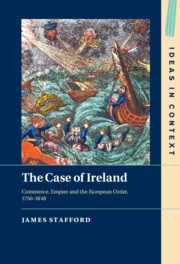Book contents
- The Case of Ireland
- Ideas in Context
- The Case of Ireland
- Copyright page
- Dedication
- Contents
- Acknowledgements
- Introduction
- Chapter 1 The Enlightenment Critique of Empire in Ireland, c. 1750–1776
- Chapter 2 Commerce without Empire?
- Chapter 3 Property, Revolution and Peace, 1789–1803
- Chapter 4 Enlightenment against Revolution
- Chapter 5 The Granary of Great Britain
- Chapter 6 Democracy, Nationality and the Social Question, 1815–1848
- Conclusion
- Bibliography
- Index
Chapter 5 - The Granary of Great Britain
War, Population and Agriculture 1798–1815
Published online by Cambridge University Press: 27 January 2022
- The Case of Ireland
- Ideas in Context
- The Case of Ireland
- Copyright page
- Dedication
- Contents
- Acknowledgements
- Introduction
- Chapter 1 The Enlightenment Critique of Empire in Ireland, c. 1750–1776
- Chapter 2 Commerce without Empire?
- Chapter 3 Property, Revolution and Peace, 1789–1803
- Chapter 4 Enlightenment against Revolution
- Chapter 5 The Granary of Great Britain
- Chapter 6 Democracy, Nationality and the Social Question, 1815–1848
- Conclusion
- Bibliography
- Index
Summary
Chapter 5 recovers the peculiar significance of the Napoleonic Wars for the formation of nineteenth-century British orthodoxies concerning the government of Ireland’s rural interior. In the decade after 1801, Ireland's rising population and grain production became central to Irish, British and European debates over Irish government. The indispensability of Irish grain to the British war effort proved the glowing potential of a model of Union that rested on an agricultural Ireland supplying the needs of industrial Britain, and provided evidence for the resilience of the British Empire in the face of Napoleon's Continental System. Patriotic Irish objections to Ireland’s agrarian turn found an unlikely echo in the pages of an influential new journal of politics and political economy, The Edinburgh Review. Alongside the agrarian improver and travel writer Edward Wakefield, Robert Malthus advanced the radical claim that only a transformation of Irish land tenure and consumption habits, under the auspices of the Westminster parliament, could bring about the diffusion of British civilisation promised by the proponents of the Union.
Keywords
- Type
- Chapter
- Information
- The Case of IrelandCommerce, Empire and the European Order, 1750–1848, pp. 174 - 209Publisher: Cambridge University PressPrint publication year: 2022

